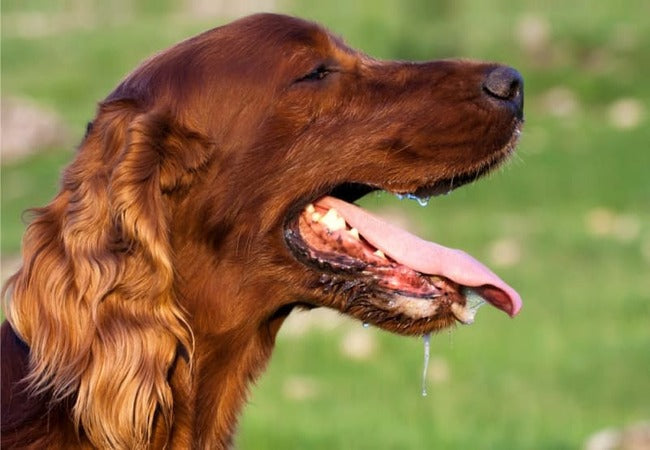2025 Vet Guide: Excessive Drooling in Dogs – Causes, When to Worry & Treatment 🐶💦

In this article
2025 Vet Guide: Excessive Drooling in Dogs – Causes, When to Worry & Treatment 🐶💦
By Dr. Duncan Houston BVSc
Drooling (ptyalism or sialorrhea) is normal for many breeds—especially jowly ones like Saint Bernards or Mastiffs—but excessive dribbling can signal discomfort or disease. Let’s explore what’s benign, what’s concerning, and how to help. 🛡️
1️⃣ Why Dogs Drool Normally
- Breed traits: Dogs with loose lips or jowls drool more often.
- Appetite or anticipation: Salivation during mealtime or when smelling food.
- Excitement or anxiety: Occasional drooling when stressed or excited.
- Heat and panting: May accompany panting on hot days.
2️⃣ When Drooling Is Concerning 🚨
Be alert if drooling is sudden, profuse, or accompanied by other symptoms:
- Bad breath, blood or pus from the mouth, swollen gums or ulcers.
- Pawing at the mouth, difficulty chewing or swallowing.
- Vomiting, diarrhea, nausea, abdomen pain or lethargy.
- Heatstroke signs like rapid panting, weakness, foaming at the mouth.
- Drooling around seizure events, neurological signs, or toxin exposure.
3️⃣ Common Underlying Causes
- Dental/oral disease: Gingivitis, periodontal disease, abscesses, tumors.
- Foreign bodies or oral injuries: Splinters, bone fragments, burns, ulcers.
- Gastrointestinal issues: Nausea from reflux, pancreatitis, gastritis, esophagitis.
- Toxins & caustic ingestions: Chemicals, poisonous plants, venomous bites.
- Neurological/metabolic issues: Facial nerve damage, megaesophagus, rabies, stroke.
- Systemic disease: Kidney, liver disease, or rabies/tetanus infections.
4️⃣ Veterinary Diagnosis
- Thorough physical exam—oral inspection and palpation.
- Dental X-rays, bloodwork, imaging (X-ray/ultrasound).
- Toxicology or neurologic evaluation if toxicosis or CNS signs present.
5️⃣ Treatment Approaches
- Dental care: Cleaning, extractions, abscess drainage.
- Remove foreign objects and treat injuries: Surgery or topical care.
- Treat GI upset: Anti-nausea meds, bland diets, reflux treatments.
- Toxin protocol: Decontamination, activated charcoal, supportive care.
- Neurological/metabolic therapy: Address underlying disease like nerve damage or organ dysfunction.
6️⃣ Home Care & Prevention
- Maintain daily dental hygiene; schedule professional evaluations.
- Keep dangerous items and chemicals out of reach.
- Offer bland food and palatable hydration during minor GI upset.
- Monitor heat exposure and ensure shade/hydration in hot weather.
- Track drooling patterns with apps like Ask A Vet, Woopf & Purrz for early vet detection.
📱 7️⃣ Tools That Support You
- Ask A Vet: Remote vet triage for drooling concerns, toxin exposure, and neurological signs.
- Woopf: Log drooling episodes, triggers, meals, medications and set reminder alerts.
- Purrz: Track drooling severity, environmental or dietary patterns, and healing progress.
📚 Frequently Asked Questions 🎓
Q: My drooly breed always slobbers—is that okay?
Yes—breeds like Saint Bernards, Bloodhounds, Mastiffs often drool heavily. But if drooling increases suddenly or comes with symptoms, consult your vet.
Q: Could drooling be motion sickness?
Absolutely. Car rides often cause nausea and excessive salivation—watch for accompanying lip licking or vomiting.
Q: Painful mouth drooling—should I worry?
Yes—drooling with bad breath, bleeding, pawing suggests mouth pain, dental disease, or injury. See your vet promptly.
💬 Owner Insight
> “Our Boxer started drooling after chewing a stick—it had splintered. A vet removed the shard and cleaned the wound, and the drooling stopped within a day.”
🏁 Final Thoughts from Dr Houston
Excessive drooling can signal everything from mild excitement to significant oral pain or systemic illness. By knowing when it’s normal, tracking symptoms, and acting promptly, you can ensure the best outcomes. With support from Ask A Vet, Woopf, and Purrz, you’re fully equipped to provide care and peace of mind through 2025 and beyond. 💙
Download the Ask A Vet app for instant advice, symptom tracking, and care guidance. 📱
AskAVet.com – Guiding you to safer, drool‑free days.






